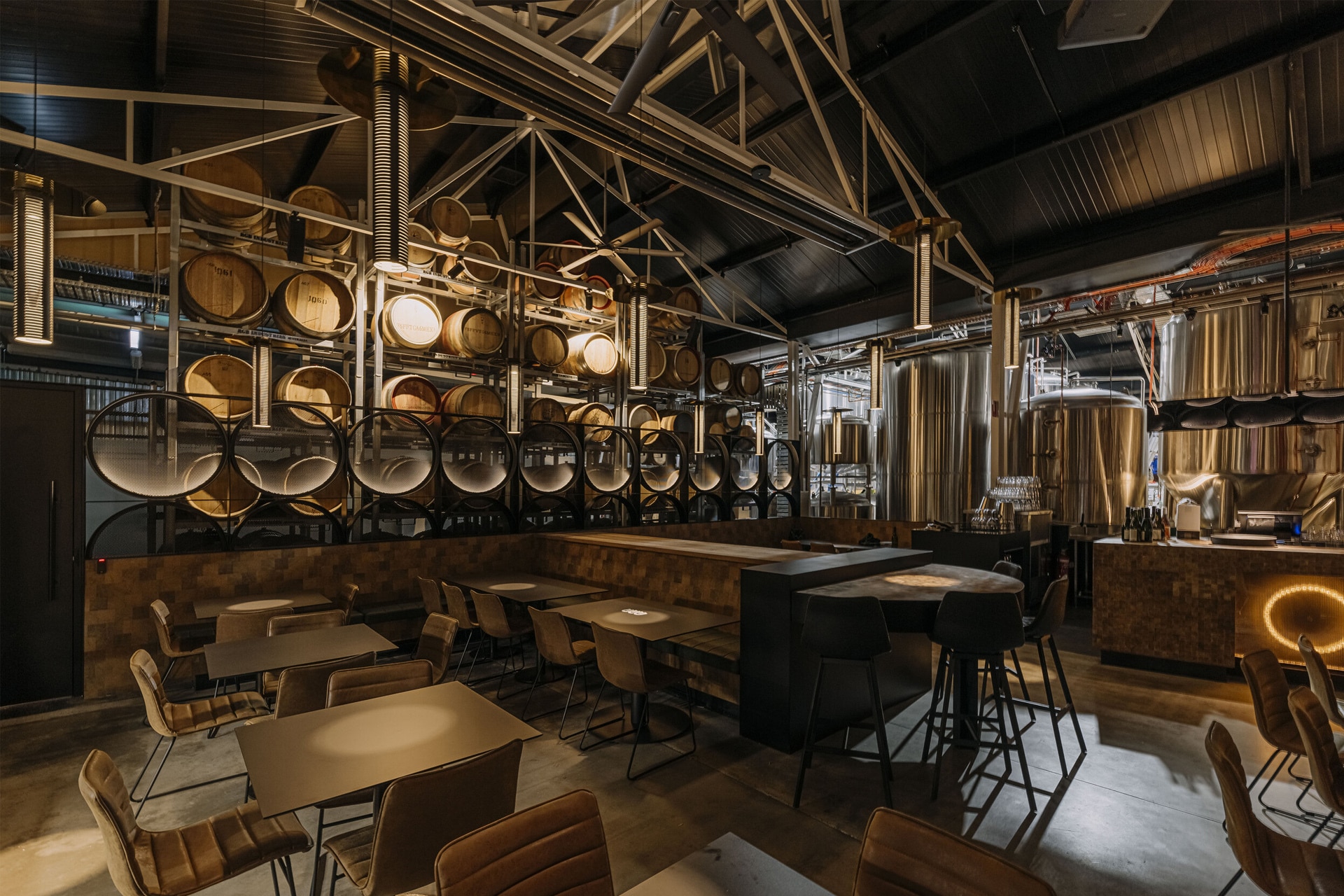How much does contract brewing cost? This question is on the minds of many aspiring brewers and established brands looking to expand their reach. Contract brewing, a partnership where a brewery produces beer for another company, offers a unique pathway into the world of craft beer, but it’s crucial to understand the financial landscape before diving in.
From the initial brewing services to packaging and marketing, the costs associated with contract brewing can vary widely. Factors like the scale of production, the complexity of the recipe, and the desired packaging all influence the final price tag. It’s essential to weigh the potential benefits of contract brewing against the financial considerations involved to make an informed decision.
Understanding Contract Brewing

Contract brewing is a common practice in the craft beer industry, where a brewery (the “contract brewer”) produces beer for another company (the “brand owner”) under a contractual agreement. This arrangement allows brand owners to focus on marketing, sales, and brand development while leaving the brewing process to experienced professionals.
Benefits of Contract Brewing
Contract brewing offers numerous advantages for both brewers and brand owners. For brewers, it provides a stable revenue stream and the opportunity to utilize excess capacity, while brand owners benefit from access to high-quality brewing facilities, expertise, and economies of scale.
Types of Contract Brewing Arrangements
There are various contract brewing arrangements that cater to different needs and business models:
- Full-service contract brewing: The contract brewer handles all aspects of production, from recipe development and ingredient sourcing to packaging and distribution. This arrangement is ideal for brand owners who are new to the industry or lack the resources to manage their own brewing operations.
- Partial-service contract brewing: The contract brewer provides specific services, such as brewing, packaging, or distribution, while the brand owner retains control over other aspects of the production process. This arrangement is suitable for brand owners with existing brewing experience or a desire for greater control over their product.
- Co-packing: The contract brewer provides packaging and labeling services for the brand owner’s beer, which is brewed elsewhere. This arrangement is often used by brand owners who have their own brewing facilities but lack the capacity or resources for packaging.
Examples of Successful Contract Brewing Partnerships
Numerous successful contract brewing partnerships have contributed to the growth of the craft beer industry. For instance,
Sierra Nevada Brewing Company
initially used contract brewing to establish its brand before building its own brewery. Similarly,
New Belgium Brewing
began as a contract brewer and later expanded its operations. These examples demonstrate the effectiveness of contract brewing as a stepping stone for new breweries and a means of expanding production for established brands.
Cost Factors in Contract Brewing
The cost of contract brewing can vary significantly depending on several factors. Understanding these factors is crucial for brewers seeking to make informed decisions and optimize their budget.
The primary cost components associated with contract brewing include brewing services, raw materials, packaging, and marketing. The cost of each component is influenced by factors such as the scale of production, the complexity of the recipe, and the desired packaging.
Brewing Services
Brewing services represent the core cost of contract brewing. They encompass the labor, equipment, and facilities required to produce the beer. The cost of brewing services typically depends on the following factors:
- Scale of Production: The volume of beer brewed significantly impacts the cost. Larger production runs generally have lower per-unit costs due to economies of scale.
- Brewing Complexity: Complex recipes involving multiple ingredients or unique brewing techniques can increase the cost due to additional time, labor, and specialized ingredients.
- Contract Brewer’s Capacity and Expertise: The contract brewer’s capacity and expertise can influence pricing. Brewers with high-capacity facilities and experienced staff may offer competitive rates.
- Brewing System: The type of brewing system used, such as a traditional kettle system or a more advanced automated system, can affect the cost of services.
Raw Materials
Raw materials, such as malt, hops, yeast, and water, represent a significant portion of the cost. Factors influencing the cost of raw materials include:
- Ingredient Quality: High-quality ingredients, such as specialty malts and premium hops, often come at a higher price.
- Ingredient Availability: Seasonal variations and market demand can impact the cost of certain ingredients.
- Supply Chain Efficiency: The efficiency of the contract brewer’s supply chain can affect the cost of procuring raw materials.
Packaging
Packaging, including bottles, cans, kegs, and labels, adds to the overall cost. Factors influencing the cost of packaging include:
- Packaging Type: The type of packaging chosen can have a significant impact on cost. Cans are generally more expensive than bottles, while kegs have the highest upfront cost.
- Packaging Size: Larger packaging sizes, such as 12-ounce bottles or 1/2-barrel kegs, may offer cost advantages per unit.
- Customization: Custom-designed labels or unique packaging features can increase the cost.
Marketing
Marketing expenses are crucial for promoting and selling the brewed beer. Factors influencing the cost of marketing include:
- Marketing Strategy: The chosen marketing strategy, such as online advertising, social media campaigns, or traditional media outreach, will determine the cost.
- Target Audience: The target audience for the beer can influence the cost of marketing. Reaching a niche market may require specialized marketing efforts.
- Marketing Channels: The cost of marketing channels can vary. Digital marketing platforms may be more cost-effective than traditional media outlets.
Factors Affecting Cost
The cost of contract brewing is influenced by various factors, including the scale of the brewery, its geographical location, and the brand’s reputation. These elements play a significant role in shaping the overall expenses associated with contract brewing.
Brewery Size and Capacity
The size and capacity of the contract brewery are crucial factors influencing the cost. Larger breweries with higher production volumes generally offer economies of scale, leading to lower per-unit costs.
- Smaller breweries with limited capacity might charge a premium for their services due to the higher overhead costs associated with running a smaller operation.
- Larger breweries with ample capacity can spread their fixed costs across a larger volume of production, resulting in lower per-unit costs.
For example, a small contract brewery might charge $5 per gallon for a 100-gallon batch, while a large brewery with a higher capacity might charge $3 per gallon for a 1000-gallon batch. This difference in cost is attributed to the economies of scale enjoyed by the larger brewery.
Location and Transportation
The geographical location of the contract brewery and the distance between the brewery and the client’s location are essential factors influencing transportation costs.
- Breweries located in areas with high transportation costs, such as major cities or regions with limited access to efficient transportation infrastructure, will likely charge higher rates to compensate for these expenses.
- Clients located close to the contract brewery will benefit from lower transportation costs, as the distance to be covered for delivery will be shorter.
For instance, a brewery located in a rural area with limited access to highways might charge an additional fee for transportation to cover the higher fuel costs and longer travel time.
Brand Recognition and Market Demand
The brand recognition and market demand for the client’s product can influence the pricing of contract brewing services.
- Established brands with a strong reputation and a loyal customer base might command higher pricing due to their brand equity.
- Emerging brands with limited brand awareness might receive more competitive pricing, as contract breweries might be willing to offer lower rates to attract new clients and gain experience in working with different brands.
For example, a craft brewery with a national following might pay a higher price for contract brewing services than a local brewery with limited brand recognition. This difference in pricing reflects the value of the established brand and its potential to generate higher revenue for the contract brewery.
Budgeting and Financial Considerations

Contract brewing, while offering a cost-effective entry point to the craft beer industry, demands a comprehensive budgeting process to ensure financial viability and success. This section delves into key budgeting considerations, financing options, and the associated financial risks and rewards.
Budgeting Process
A well-structured budget is essential for contract brewers to manage expenses, forecast revenue, and assess profitability. It involves a detailed breakdown of costs, profit margin calculations, and a thorough analysis of the return on investment.
- Cost Estimation: The initial step involves meticulously estimating all brewing-related costs, including raw materials, packaging, labeling, and transportation. Other expenses like marketing, licensing, and insurance should also be factored in. A detailed breakdown of these costs helps create a realistic budget and allows for adjustments based on market fluctuations.
- Profit Margins: Determining profit margins is crucial for pricing products competitively and ensuring profitability. Contract brewers should consider the cost of goods sold, operating expenses, and desired profit margins to set prices that cover costs and generate a reasonable return. A common approach is to use a percentage-based markup on the cost of goods sold to calculate selling prices.
- Return on Investment (ROI): Evaluating the ROI is essential for determining the financial viability of a contract brewing venture. This involves calculating the expected return on the initial investment, considering factors like production volume, selling price, and operating costs. A positive ROI indicates a profitable venture, while a negative ROI suggests potential financial challenges.
Securing Funding and Financing Options
Securing funding is critical for launching and sustaining a contract brewing operation. There are several financing options available, each with its own benefits and drawbacks.
- Personal Savings and Investments: Using personal savings or investments is a common starting point for many contract brewers. This option offers flexibility but might limit initial investment and growth potential.
- Bank Loans: Traditional bank loans can provide substantial funding, but they typically require collateral and a solid business plan. Banks assess creditworthiness, financial history, and business projections before approving loans.
- Crowdfunding: Platforms like Kickstarter and Indiegogo allow entrepreneurs to raise funds from a large group of individuals. This approach offers a unique opportunity to engage with potential customers and build a community around the brand. However, it requires significant marketing efforts and can be time-consuming.
- Grants and Incentives: Government grants and incentives can provide financial assistance for businesses in specific industries, including craft brewing. These programs often have specific eligibility criteria and application processes.
Financial Risks and Rewards
Contract brewing presents both financial risks and potential rewards. Understanding these aspects is essential for making informed decisions.
- Financial Risks:
- Competition: The craft brewing industry is highly competitive, with a growing number of breweries vying for market share. This competition can lead to price wars and challenges in securing shelf space.
- Market Fluctuations: Consumer preferences and trends in the craft beer market can change rapidly. This volatility can impact sales volume and profitability.
- Contract Brewing Agreements: Contract brewing agreements should be carefully reviewed and negotiated to ensure favorable terms and minimize potential risks. Issues like pricing, production volume, and contract termination clauses should be clearly defined.
- Financial Rewards:
- Lower Startup Costs: Contract brewing eliminates the significant capital investment required for building and equipping a brewery, allowing entrepreneurs to enter the market with lower upfront costs.
- Flexibility and Scalability: Contract brewing offers flexibility in production volume, allowing brewers to scale up or down based on demand. This adaptability can help manage production costs and optimize profitability.
- Access to Expertise: Contract brewers often benefit from the expertise of experienced brewing facilities, leveraging their knowledge and resources to produce high-quality beer. This access to expertise can enhance product quality and brand reputation.
Alternative Brewing Models: How Much Does Contract Brewing Cost
Contract brewing is just one option for bringing your craft beer to market. It’s essential to compare and contrast contract brewing with other models to determine the best fit for your brewery’s specific needs, goals, and resources. This section delves into various alternative brewing models, exploring their advantages and disadvantages in terms of cost, control, and scalability. We’ll analyze the factors that influence the choice of brewing model for a specific business, allowing you to make an informed decision about the best path for your craft beer journey.
Self-Production, How much does contract brewing cost
Self-production involves owning and operating your own brewery, encompassing all aspects from brewing to packaging and distribution. This model offers the highest level of control over the entire process, allowing you to craft your beer exactly as you envision it. However, it demands significant upfront investment in equipment, facilities, and staff, making it a high-risk, high-reward proposition.
Advantages
- Complete Control: You have complete control over every aspect of the brewing process, from recipe development to packaging and distribution. This allows you to create a truly unique product and maintain a consistent brand identity.
- Brand Building: Owning your own brewery allows you to build a strong brand identity and connect directly with your customers. This can be particularly valuable for smaller breweries seeking to establish a local presence.
- Potential for Growth: With careful planning and execution, self-production can lead to significant growth and profitability. As your brewery expands, you can scale up production and distribution to meet increasing demand.
Disadvantages
- High Upfront Investment: Setting up a self-production brewery requires a substantial upfront investment in equipment, facilities, and staff. This can be a significant barrier to entry for new brewers.
- Operational Complexity: Managing a self-production brewery involves a complex array of tasks, including brewing, packaging, distribution, marketing, and sales. This can be challenging for entrepreneurs with limited experience in all these areas.
- Risk of Failure: The high upfront investment and operational complexity of self-production breweries can lead to a higher risk of failure. This is particularly true for new brewers who may lack the experience and resources to navigate the challenges of running a successful brewery.
Nano-Brewing
Nano-brewing involves producing beer on a very small scale, typically using equipment with a capacity of less than 15 barrels. This model is often characterized by a focus on experimentation, limited distribution, and a close connection with the local community.
Advantages
- Lower Start-up Costs: Nano-breweries require a significantly lower upfront investment compared to larger breweries, making them an attractive option for aspiring brewers with limited capital.
- Flexibility and Experimentation: The small scale of nano-brewing allows for greater flexibility and experimentation with different recipes and styles. This can be particularly appealing for brewers who enjoy exploring new brewing techniques and flavors.
- Strong Community Ties: Nano-breweries often operate within small communities, fostering close relationships with local residents and creating a sense of place. This can lead to strong brand loyalty and a dedicated customer base.
Disadvantages
- Limited Production Capacity: Nano-breweries have a limited production capacity, which can restrict their ability to meet growing demand or expand into new markets.
- Distribution Challenges: The small-scale nature of nano-brewing can make it challenging to distribute beer to a wider audience. This can limit their potential for growth and profitability.
- Potential for Oversaturation: The popularity of nano-brewing has led to a growing number of small breweries in some areas. This can create a competitive environment where it is difficult to stand out from the crowd.
Crowdfunded Brewing
Crowdfunding is a method of raising capital from a large number of individuals, typically through online platforms. This model allows brewers to access funding for their projects, often in exchange for rewards such as early access to beer, merchandise, or even equity in the brewery.
Advantages
- Alternative Funding Source: Crowdfunding provides an alternative source of funding for brewers who may not have access to traditional loans or investors. This can be particularly helpful for startups or breweries with innovative ideas.
- Community Engagement: Crowdfunding can foster a strong sense of community engagement by allowing supporters to contribute to the brewery’s success. This can lead to increased brand loyalty and word-of-mouth marketing.
- Early Validation: A successful crowdfunding campaign can provide early validation of a brewery’s concept and market appeal. This can help to attract further investment and build confidence in the venture.
Disadvantages
- Uncertain Outcome: Crowdfunding campaigns are not guaranteed to succeed, and brewers may not reach their fundraising goals. This can lead to delays or even the cancellation of the project.
- Reward Fulfillment: Meeting reward fulfillment obligations can be time-consuming and challenging, especially for small breweries with limited resources. This can strain relationships with supporters and impact the brewery’s reputation.
- Loss of Control: Crowdfunding campaigns can involve giving up some degree of control over the brewery’s direction, particularly if equity is offered in exchange for funding. This can create tension between the founders and investors.
In the world of craft beer, contract brewing presents a compelling opportunity for brewers to bring their visions to life. By understanding the cost factors, budgeting strategically, and exploring alternative models, aspiring brewers can navigate the financial complexities of contract brewing and achieve their brewing dreams. Ultimately, the success of any contract brewing venture hinges on a thorough understanding of the costs involved, careful planning, and a clear vision for the future.
Expert Answers
What are the most common contract brewing pricing models?
Common models include per-barrel pricing, fixed-cost contracts, and tiered pricing based on production volume. Each model offers unique advantages and disadvantages, and the best choice depends on your specific needs and budget.
How can I find a reliable contract brewer?
Research reputable contract brewers, review their portfolio, and consider factors like location, capacity, and equipment capabilities. Networking within the brewing community and attending industry events can also help connect you with potential partners.
What are the potential risks of contract brewing?
Risks include dependence on the contract brewer, potential quality control issues, and the possibility of unforeseen costs. It’s crucial to establish clear contracts, maintain open communication, and conduct thorough due diligence before entering into any agreement.







